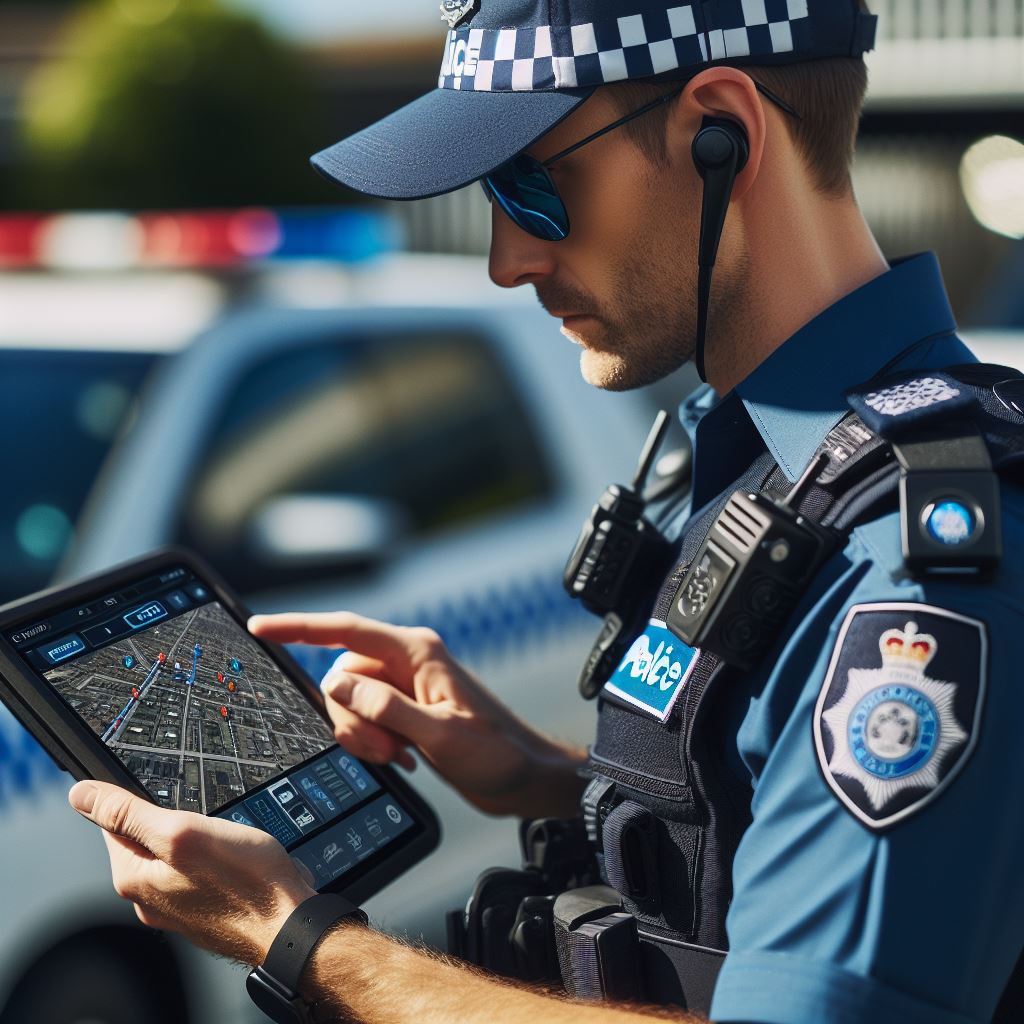Introduction
In the dynamic landscape of law enforcement in Australia, police officers confront an array of challenges that underscore the intricacies of their crucial role.
As guardians of public safety, they navigate complexities ranging from evolving criminal tactics to societal expectations, forming the frontline defense against threats to the well-being of communities.
This blog post delves into the formidable challenges encountered by police officers across Australia.
From combating emerging forms of crime to upholding the principles of justice, their responsibilities are diverse and demanding.
In the face of technological advancements, societal changes, and unprecedented global challenges, the role of police officers has become more multifaceted than ever before.
Police officers stand as pillars of societal order, ensuring the safety and security of citizens.
Beyond law enforcement, they engage in community-building, fostering trust and cooperation.
Their presence is foundational to the maintenance of a harmonious and law-abiding society, and their dedication contributes significantly to the overall well-being of communities.
This blog post aims to illuminate the intricate tapestry of challenges that police officers grapple with daily in Australia.
By shedding light on the complexities they face, we seek to foster a deeper understanding and appreciation for the relentless dedication exhibited by these law enforcement professionals.
Through this exploration, we not only acknowledge the challenges but also underscore the importance of supporting and recognizing the vital role played by police officers in safeguarding the fabric of our communities.
Join us in unraveling the layers of challenges faced by police officers in Oz, as we delve into the dynamic and impactful world of law enforcement Down Under.
Job Stress
The job of a police officer is undoubtedly one of the most stressful professions in Australia. The daily challenges faced by these officers not only test their physical abilities but also take a toll on their mental well-being.
High Level of Job Stress
- Policing involves constant exposure to danger and unpredictable situations, leading to a high level of job stress.
- Officers often face life-threatening scenarios such as armed confrontations, pursuits, and dealing with violent individuals.
- The pressure to uphold law and order while safeguarding the community adds immense stress to their daily work.
- Work-related stressors, such as long hours, shift work, and frequent exposure to traumatic incidents, contribute to the overall stress levels.
Examples of Stressful Situations
- Responding to emergency calls, including domestic disputes, accidents, and incidents involving weapons, puts enormous pressure on police officers.
- Confronting aggressive and hostile individuals who may be under the influence of drugs or alcohol can be extremely stressful.
- Investigating crimes and gathering evidence while being under time constraints adds to their daily stressors.
- Handling public demonstrations and managing crowd control during tense situations requires quick decision-making and can be highly stressful.
Psychological Impact of Job Stress on Officers
The constant exposure to stressful situations has a significant psychological impact on police officers.
The stress they experience can lead to various mental health issues, including anxiety and depression.
Officers often struggle with sleep disturbances, nightmares, and intrusive thoughts related to traumatic incidents they have encountered.
They may also experience emotional exhaustion, irritability, and difficulty in maintaining healthy relationships due to the nature of their work.
Additionally, the prolonged exposure to stress can lead to post-traumatic stress disorder (PTSD) in some officers, which further exacerbates their psychological well-being.
The psychological impact of job stress on officers not only affects their personal lives but can also impair their professional performance.
It can hinder their decision-making abilities, increase the risk of errors, and lead to a decline in job satisfaction and motivation.
Overall, the job stress experienced by police officers in Australia cannot be underestimated.
The demanding nature of their work and the constant exposure to stressful situations take a toll on their mental and emotional well-being.
It is crucial to recognize and address these challenges to ensure the long-term health and effectiveness of our law enforcement professionals.
Read: Police Training: What Does It Involve?
Physical Demands
Being a police officer in Australia comes with a set of physical challenges that are demanding and rigorous. Here are some of the key aspects:
Long Working Hours and Irregular Shifts
Police officers in Australia often face long working hours and irregular shift patterns as part of their job. They are required to work around the clock, ensuring public safety and maintaining law and order.
These demanding schedules can take a toll on their physical well-being.
Juggling between day and night shifts disrupts the natural sleep pattern of police officers, leading to fatigue and exhaustion.
This constant change in working hours poses a tremendous challenge to their physical stamina and mental agility.
Physical Fitness Requirements and Training
To cope with the demands of the job, police officers in Oz are required to maintain a high level of physical fitness. They need to be prepared for any situation that may arise during their duty.
Police recruits undergo rigorous physical training at police academies to ensure that they are fit enough to handle physical confrontations and emergencies.
This training includes endurance exercises, strength-building workouts, and intensive cardiovascular activities.
The physical fitness requirements for police officers are stringent and continue throughout their career. They need to pass regular fitness tests to ensure they remain in optimal physical condition.
The Role of Physical Strength
The physical challenges of being a police officer extend beyond long hours and fitness tests. They often find themselves in physically demanding situations that require strength and agility.
When responding to emergencies or apprehending suspects, police officers may need to engage in physical altercations to protect themselves and others. They face the risk of injuries and need to be able to use force when necessary.
Additionally, police officers are required to wear heavy equipment, such as bulletproof vests and duty belts, which can put strain on their bodies during long shifts.
Maintaining physical health is crucial for them to fulfill their duties effectively.
Occupational Hazards and Injuries
Police work involves various risks and potential injuries due to the nature of the job. From chasing criminals to dealing with volatile situations, officers are exposed to physical hazards on a daily basis.
They may face injuries like sprains, fractures, and concussions while apprehending offenders or responding to emergencies.
The physical demands of the job can lead to long-term health issues such as chronic pain, back problems, and joint ailments.
Your Personalized Career Strategy
Unlock your potential with tailored career consulting. Get clear, actionable steps designed for your success. Start now!
Get StartedMaintaining Physical and Mental Well-being
Given the physical demands of the job, it is crucial for police officers to prioritize their physical and mental well-being. Regular exercise, proper nutrition, and sufficient sleep are essential to maintain their physical fitness levels.
Moreover, seeking support for mental health challenges is equally crucial. The stress and trauma associated with police work can impact their overall well-being.
Engaging in mental health programs and seeking professional assistance when needed is vital for their resilience and longevity in the profession.
In a nutshell, the physical challenges faced by police officers in Australia are immense.
From long working hours and irregular shifts to the physical fitness requirements and occupational hazards, their job demands peak physical performance and mental fortitude.
It is essential to appreciate the dedication and sacrifices made by these officers in ensuring public safety.
Read: How to Become a Police Officer in Australia
Risk and Danger
Being a police officer in Australia is undoubtedly a challenging and demanding profession. Police officers face numerous risks and dangers on a daily basis while serving and protecting their communities.
Inherent Risks
- Police work involves inherent risks that officers must face every day.
- They put themselves in harm’s way to maintain law and order.
- From traffic stops to domestic disputes, officers are constantly exposed to unpredictable situations.
- Dealing with high-risk individuals and volatile situations is a part of their routine.
Exposure to Violence
- One of the major challenges for police officers is the constant exposure to violence.
- They often find themselves in the midst of dangerous and violent encounters.
- From handling riots to arresting armed criminals, the risk of physical harm is ever-present.
- Officers must always be prepared for the possibility of facing armed individuals.
Potential for Injuries
- Police work involves significant physical demands, increasing the potential for injuries.
- Officers may sustain injuries while apprehending suspects or engaging in physical altercations.
- Confrontations can quickly escalate, leading to injuries to both officers and suspects.
- Moreover, vehicular accidents while responding to emergencies also pose a substantial risk.
Emotional Toll
- Dealing with crime scenes and traumatic incidents takes a toll on the emotional well-being of police officers.
- They bear witness to gruesome scenes and have to remain composed to carry out their duties.
- The constant exposure to traumatic events can lead to post-traumatic stress disorder (PTSD).
- Officers often struggle with the emotional aftermath of traumatic incidents.
In general, police officers in Australia face numerous challenges, primarily related to the inherent risks and dangers of their profession.
The exposure to violence, potential for injuries, and the emotional toll of dealing with crime scenes contribute to the difficulties faced by these dedicated individuals.
It is crucial that society recognizes and supports the contributions and sacrifices made by police officers while ensuring their safety and well-being.
Read: Day in the Life of an Aussie Police Officer

Public Perception and Media
In the intricate interplay between law enforcement, public perception, and media scrutiny, challenges arise that profoundly impact the dynamics between police officers and the communities they serve.
The public perception of police officers often faces complexities, influenced by various factors that shape community attitudes.
Addressing these challenges head-on is imperative for fostering positive relationships between law enforcement and the public.
Media scrutiny and portrayal of law enforcement
Media scrutiny plays a pivotal role in shaping public perceptions of police officers. The portrayal of law enforcement in the media, whether through news coverage or fictional representations, significantly influences public opinion.
Media narratives have the power to amplify positive actions but can also magnify negative incidents, contributing to a skewed perception of law enforcement.
Effect of negative incidents on public trust
Negative incidents involving police officers can erode public trust, creating a delicate equilibrium that requires careful consideration.
Instances of misconduct or excessive use of force can have far-reaching consequences, affecting not only the immediate parties involved but also permeating public trust in law enforcement agencies.
Rebuilding this trust demands proactive measures, including transparency, accountability, and effective communication between law enforcement and the communities they serve.
In navigating these intricacies, it is essential to recognize the symbiotic relationship between public perception, media portrayal, and the overall trust in law enforcement.
As we delve into the challenges posed by public perception and media scrutiny, it becomes evident that proactive efforts to foster transparency, accountability, and positive community engagement are indispensable for cultivating a relationship of trust between law enforcement and the public.
Only through a concerted and sustained commitment to these principles can the narrative surrounding law enforcement evolve, creating a foundation for constructive dialogue and mutual understanding.
Read: Diplomatic Immunity: The Basics
Explore Further: Top AU Universities for Aspiring Policy Analysts
Delve into the Subject: Physical Fitness Standards for Police
Stand Out with a Resume That Gets Results
Your career is worth more than a generic template. Let us craft a resume and cover letter that showcase your unique strengths and help you secure that dream job.
Get HiredBureaucracy and Administrative Duties
Police officers in Oz face numerous bureaucratic challenges that often hinder their ability to effectively carry out their law enforcement duties.
These challenges primarily manifest in the form of excessive paperwork, reporting requirements, and administrative responsibilities.
Excessive Paperwork
- Police officers are burdened with an overwhelming amount of paperwork that requires significant time and effort.
- Filling out forms, documenting incidents, and completing various reports are essential parts of their administrative duties.
- This paperwork includes recording details of arrests, creating incident reports, and documenting evidence accurately.
- Completing these tasks meticulously is crucial as they serve as crucial legal records.
Reporting Requirements
- Police officers must comply with extensive reporting requirements imposed by superiors and governing bodies.
- These reports often include documenting daily activities, responding to incidents, and analyzing crime trends.
- Reporting requirements aim to ensure transparency, accountability, and improve the overall efficiency of law enforcement.
- However, officers may find themselves spending more time on paperwork than on proactive policing.
Administrative Responsibilities
- Besides their law enforcement duties, police officers are assigned various administrative responsibilities.
- These responsibilities include managing departmental resources, coordinating with other agencies, and overseeing training programs.
- Administrative tasks, such as scheduling officer shifts and conducting performance evaluations, add to their workload.
- While these responsibilities are necessary for the functioning of the police force, they can divert officers’ focus away from their primary law enforcement tasks.
The presence of excessive bureaucracy and administrative duties can have significant implications for police officers, their job satisfaction, and overall public safety.
Effects of Bureaucracy and Administrative Duties
- Bureaucratic challenges can lead to job dissatisfaction among police officers, who often join the force motivated by their passion for active policing and crime prevention.
- Spending excessive time on paperwork and administrative tasks can result in reduced morale and burnout among officers.
- Diverting officers’ focus from primary law enforcement tasks may compromise their ability to respond promptly to emergencies and address community needs.
- Reduced visibility and engagement may weaken the trust and cooperation between the police and the community they serve.
- Furthermore, officers burdened with excessive bureaucracy may experience reduced job effectiveness and productivity, negatively impacting the overall performance of the police force.
It is vital for police departments and policymakers to address these bureaucratic challenges and find ways to minimize administrative burdens on officers without compromising accountability and transparency.
Implementing streamlined reporting systems, utilizing technology for paperwork automation, and assigning additional administrative staff to support officers are potential solutions to mitigate these challenges.
By alleviating bureaucratic burdens, police officers in Oz can focus more on their primary law enforcement tasks, effectively serving and protecting their communities, and enhancing overall public safety.
See Related Content: Women in Politics: Changing the Australian Scene
Lack of Resources and Funding
Struggle to meet the demands of an increasing population
- With a rising population, police forces face the challenge of providing effective and timely services to everyone.
- Limited resources and funding make it difficult to maintain adequate police presence in growing communities.
Shortage of personnel
- A lack of resources and funding often leads to a shortage of police officers.
- The limited number of personnel puts immense pressure on existing officers, affecting their ability to respond promptly to emergencies and engage in community policing.
Outdated equipment and technology
- Inadequate funding hampers the acquisition of modern equipment and technology.
- Outdated equipment not only jeopardizes the safety of police officers but also reduces their effectiveness in preventing and solving crimes.
Effects on Police Force
Increased workload and stress levels
- Limited resources and personnel result in heavier workloads for police officers.
- Handling an excessive number of cases hampers their ability to provide quality service and leads to high stress levels.
Inability to respond effectively to emergencies
- With limited resources, police forces struggle to respond promptly to emergencies.
- Delays in reaching crime scenes or providing assistance can have severe consequences for public safety.
Reduced community engagement and trust
- Lack of funding often leads to a shift in priorities, reducing community engagement programs.
- Insufficient resources for community policing can erode trust between the police and the community, hindering crime prevention efforts.
Compromised officer safety
- Outdated or inadequate equipment compromises the safety of police officers while on duty.
- Without proper protective gear and modern tools, officers face increased risks, posing a threat to their lives and well-being.
Recommendations for Improvement
Adequate funding allocation
- Governments should prioritize funding allocations for police forces to ensure they have the necessary resources to carry out their duties effectively.
Recruitment and training programs
- Governments should invest in recruitment and training programs to address the personnel shortage.
- Expanding the police workforce will help alleviate the workload pressure and enhance community policing efforts.
Upgrading equipment and technology
- Allocating funding to procure modern equipment and technology is crucial for enhancing the capabilities of the police force.
- Upgraded tools and technology empower officers to respond efficiently and perform their duties more safely.
Strengthening community partnerships
- Police departments should actively engage with communities through collaboration and outreach programs.
- Building trust and fostering positive relationships will enable mutual support and more effective crime prevention strategies.
The challenges faced by police officers in Australia, including limited resources and funding, have a significant impact on the police force’s ability to serve and protect the community.
Adequate funding, recruitment efforts, upgraded equipment, and enhanced community partnerships are essential for addressing these challenges.
By prioritizing these areas, we can contribute to a safer and more secure society for both police officers and the general public.
Conclusion
In closing, this blog post has shed light on the formidable challenges facing police officers in the line of duty.
From heightened risks to the evolving complexities of law enforcement, these professionals navigate a demanding landscape that requires constant adaptation and resilience.
Recognizing and addressing these challenges is paramount, as it directly impacts the well-being and effectiveness of those who tirelessly uphold public safety.
The challenges discussed, ranging from mental health struggles to the inherent dangers of the job, underscore the urgent need for comprehensive support systems within law enforcement agencies.
It is imperative for society to acknowledge the unique stressors police officers face daily, fostering an environment that prioritizes their mental and physical well-being.
By doing so, we not only contribute to the enhancement of individual officers’ lives but also fortify the foundations of a robust and responsive law enforcement system.
In appreciating the sacrifices made by police officers, it is crucial to extend gratitude and support.
These professionals play an integral role in maintaining the social fabric, often confronting adversity on our behalf.
Acknowledging their challenges and actively working towards solutions ensures that our law enforcement agencies remain resilient, capable, and empowered to protect and serve our communities effectively.
As we conclude, let us stand united in recognizing the dedication of police officers and commit to fostering an environment that empowers them to overcome the challenges they face, ensuring a safer and more secure future for all.




